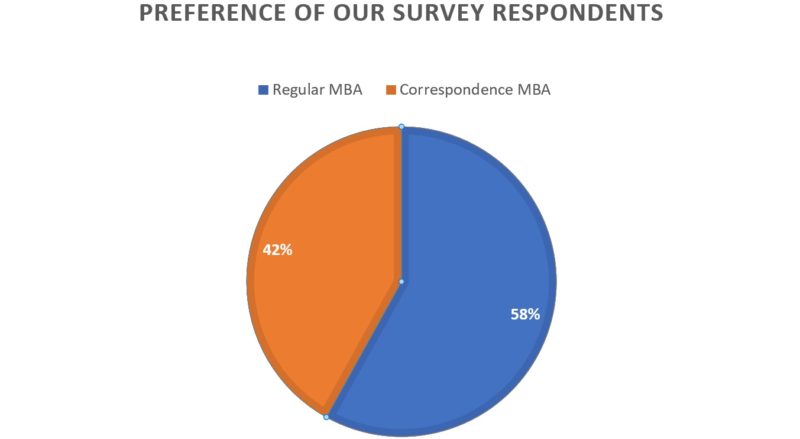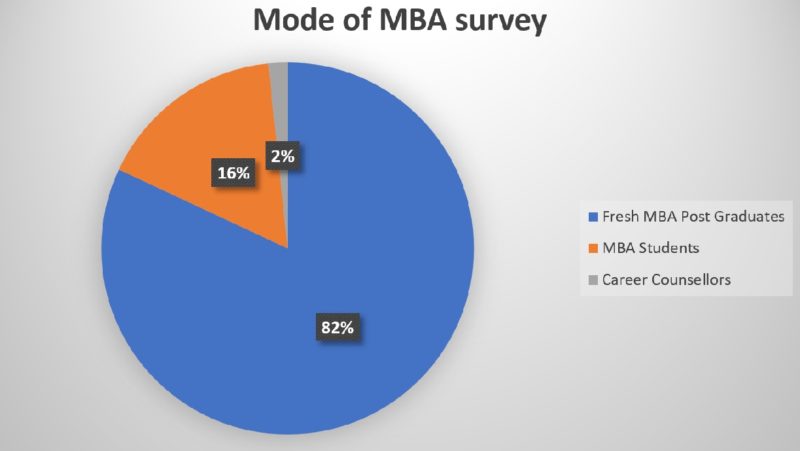With the number of fresh engineering graduates increasing with each passing year, and with a sizable chunk of these graduates preferring to pursue Master of Business Administration (MBA), it naturally becomes confusing when it comes to choosing between a regular mode of study and correspondence as far as acquiring an MBA post-graduation is concerned.
Agreed, both the above modes guarantee an MBA after a Bachelors of Engineering degree; but which of these is good for advancing career and skills?
To demystify this question, we conducted a survey of fresh MBA passouts, along with taking inputs from career experts/counsellors who threw enough light on the regular vs correspondence mode MBA aspect.
First things first – an MBA is good
“When the Indian Institute of Management (IIM) centres were established, majority of the intake for MBA courses was from engineering graduates,” states Dr. Ali Khwaja, Founder and Chairman of Bengaluru-based Banjara Academy that is doing its bit in empowering the youth to make the right career moves.
Career counsellors now believe that the number of engineering graduates taking up MBA has in fact tripled.
“Most of the engineers choose MBA as their career interest lies in administration and business. Failure to identify interests correctly and parental pressure are the main factors for students to opt for engineering at the graduation level rather than a Bachelors in Business,” states a professor at a reputed management institution in Bengaluru; on the condition of anonymity.
However, do remember to take up the right specialisation during your MBA study. This is vital to put your engineering skills to test.
What does our survey say – regular or correspondence?
As per our survey, nearly 60% of the respondents voted in favour of pursuing MBA via the regular college mode. Reason given for this trend is the fact that a regular MBA affords complete management exposure to engineering graduates. Exposure to practicals was also a preferred reason among our respondents.
Our respondents, having completed MBA through the regular mode, also opined that they were totally industry ready.
“Engineering graduates, pursuing MBA from the IIMs are trained completely and even offered placements at companies considered as top names today. This is vital for individuals who target management roles at top firms,” opines a Bengaluru-based career expert possessing decades of experience in counselling and career guidance.
However, our respondents also stated that financial condition of candidates is also an option to ponder before choosing the regular mode of study. In case you are financially sound, or in a position to raise an education loan, you could opt for a regular two-year MBA. Here, you would be required to crack the Common Admission Test (CAT), and the Post-Graduate Common Entrance Tests (PG-CET) conducted by the respective state governments.
You can also check out the pie-chart below that details results of our survey:

Don’t worry, even correspondence MBA is good; conditions apply
An MBA acquired through correspondence qualifies as an MBA certification. Approximately 40% of our survey respondents up-voted a correspondence MBA. However, these respondents possessed work experience of more than two years; some even close to eight years.
“MBA through correspondence is good for engineers possessing at least a couple of years of work experience,” was the general sentiment echoed in our survey.
“MBA through correspondence is preferred for those preferring to work and study at the same time, and for engineering graduates preferring not to attend regular college,” added the management professor (on anonymity).
The professor also recommends correspondence MBA to working engineers who consider that they have slogged enough in their current jobs, and prefer to look at a rapid career progression.
Another advantage that a correspondence MBA program offers is less financial burden. Even if you are a fresher, you could opt for correspondence programs; these usually cost lesser than the conventional college programs.
Recruiters also have ‘preferences’
As per experts, the trend now has changed. Various big names (companies) prefer their employees to be regular MBA post-graduates. This is true in the case of freshers applying to jobs at the ‘reputed’ firms.
“When we hire fresh MBA post-graduates for positions, we insist on a regular two-year full-time certification; correspondence and part time post-graduates are a strict no-no in our company,” stated a recruiter at a leading multi-national company (MNC) in Bengaluru.
The verdict is clear
Our survey respondents, numbering over 150, and expert career counsellors advice fresh engineering graduates to analyse their aim properly before opting in for an MBA program. A full-time post-graduation, and its correspondence counterpart are both valuable; but the latter comes with a lot of conditions.
Inputs for the story are also through our survey respondents, check the below pie-chart:

Written by Rahul R, Senior TechnIcal Journalist at EFY







